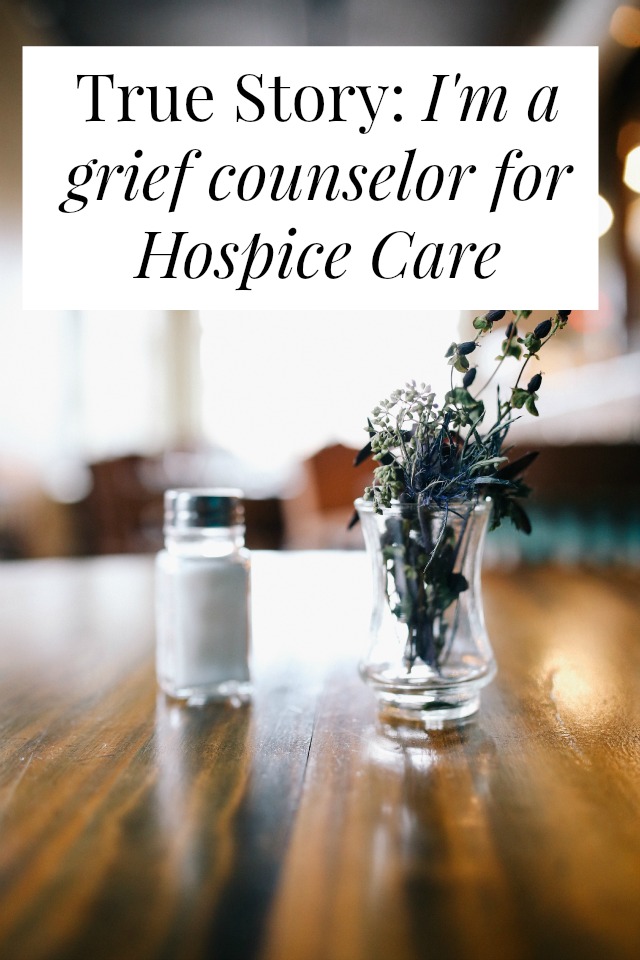
Tell us a bit about yourself!
I’m 30, from Kansas City. No husband or kids yet. I love our local sports scene – especially those Royals and Chiefs! I’m a big reader and Netflix binge watcher. For work, I provide grief support to families who use hospice care.
What’s your official job title?
I’m a Bereavement Coordinator.
Can you tell us about the professional path that brought you here?
If you had told me 10 years ago, or even 5 for that matter, that I would be going into grief counseling, I would have called you crazy. My undergrad was in Public Relations!
However, during the process for my Master’s Degree, I had to do an internship. One of the few conducive with already working full time was for a grief counseling center. I was really intimidated but intrigued. I spent a year at my internship there and kind of fell in love with the process of working with people in grief. By the time I graduated I knew I wanted to eventually do grief work. Not just with death, but all forms of loss. I spent a year in community mental health before this job opportunity came up.
What sort of schooling and training did you go through to become a grief counselor?
I got my Master’s Degree in Counseling Psychology and spent my internship doing grief work. I lead support groups and provided individual and family counseling to children and adults. I’m also certified in the Grief Recovery Method which required a weekend of intensive training by The Grief Recovery Institute.
What does an average work day look like for you?
There is really no average day. I have a set of responsibilities that I schedule throughout the week. For instance, bereavement coordinators need to sit in on patient information review meetings averaging about once a week that take about 2 hours. We also send out monthly mailings to our bereaved. I make follow up assessment phone calls to our bereaved families about 6 weeks after the loss (right after everyone not involved starts to move on).
I provide support to patients still living and/or their families as requested. I also lead several grief support groups throughout the month at various community centers and senior living facilities. Those are some of my favorite times of the week! I make bereavement visits to family members and caregivers after their loss.
Any day can include some or all of these things! I also attend a lot of funerals on behalf of our hospice. Funerals are oddly beautiful and inspiring when you’re are 3rd party.
Do you counsel the patients themselves? Their families? Both?
The hospice patients I have worked with so far have been regarding their own spouses that passed. We have actually had several husband and wife pairs on our service simultaneously and when one dies, I occasionally provide some support to the other.
Otherwise, my primary role is with family members after their loved one has died. In that way, working with patients and the families is similar. It’s about coping with the loss that has happened. I am available for patients to discuss end of life issues but they have assigned social workers who do an excellent job at that and don’t usually need that form of support from me.
I imagine that this job is very emotionally taxing. How do you take care of yourself?
It can be brutal. Sometimes I find that I’m exceptionally sensitive to difficult things because I’ve heard so many sad stories that day. Especially when the patient was one of our younger ones. I manage by being clear with my boundaries between work and personal life.
I also am big on limiting my exposure to hard things and bad news outside of work. I don’t dig my head in the sand but I don’t invite a bunch of sad news into my life either. I try to balance the heavy of my job by keeping my life pretty light otherwise.
I also listen to a lot of Taylor Swift in my car between visits. Pop Taylor, I couldn’t get into country Taylor. I can’t be good at my job unless I keep myself as emotionally well as possible. If I need a good cry I just pop in “My Girl”
Do you ever worry that you’ll become emotionally numb – after being around death all day, every day?
Sometimes, with my dark sense of humor it can seem that way. But that’s why it’s so important to treat each case uniquely. It’s not just another death. It’s a loss specific to every person I call or meet. I may do this several times a day but the experience is always new when you’re the one who has lost someone.
In fact, it’s more the opposite that has happened now. I am probably overly fearful of losing my loved ones, especially my parents. I’ve always been a bit of a worrier but it escalated after I got involved in grief work. Every time my mom calls I’m terrified she has horrible death in the family news.
Have there been any cases that have hit you harder than others?
I can’t tell you specific cases, of course. However, I do regularly get involved in cases where the patient leaves behind children in one way or another. These are usually our younger patients and they also seem to tend to decline more suddenly after signing up for hospice.
I love working with kids in this capacity but I usually need a little extra self care or pampering after working with a young girl who will never get to have her mom help her pick out a homecoming dress.
During my internship I dealt with couples who lost children to traumatic death or suicide. Those were always hard to “leave at the office”. When they come to mind in my off time I try to be intentional about saying a prayer and wishing them well – but then continuing in living my life.
Do you think this is your ‘forever job’?
I’m happy where I am for the near future, but bereavement can and will wear on you. I think more than a skill set it takes a tolerance for unfixable situations. Sitting in sad moments and just letting them be sad is not easy. As long as I feel like I can do that with compassion, I’ll stay. At some point though, that will be too hard.
Has it affected the way you feel about spirituality or the afterlife?
I don’t know that it’s changed my personal beliefs but it has made it very important for me to keep an open mind and heart with the family or patient. Hospice is comfort first. So, when I call a family to check in and they have a totally different belief system than mine and it brings them comfort – that’s for me to encourage and not question.
I suppose in a way I have changed because I’ve become far more tolerant and open to learning.
Are there any tools/books/platforms that your clients and patients have found particularly helpful?
In regards to grief , The Grief Recovery Handbook by John James and Russell Friedman is an empowering set of steps toward letting go of pain. There is a group program for working the program offered nationwide.
As for supporting someone dealing with crisis or grief – I have never read a better article than this one: How to not say the wrong thing. That article should be required reading for anyone who wants to help a friend in a difficult time. There is pretty much nothing to say that means as much as acknowledging the pain and being there.
What advice would you give to someone who’s loved one has just entered hospice?
Hospices have a myriad of support available to you so that instead of being a caregiver or advocate, you can be a husband/wife/son/daughter /etc. Use them! Take exceptional care of yourself. Limit obligations, eat well, have a routine.
Ask your nurse care manager every question you have – none are dumb. Hospice nurses are the kindest and most gentle people I’ve met. Good ones will provide you the education you need to feel at peace about your choice to move forward with hospice.
Do you guys have any questions for our interviewee? Do any of you work around death? And if you do, how do you deal?






Thank you so much for what you do! I lost my father last year to pancreatic cancer, and the counseling and care for both him and my family through hospice really helped us in dealing with the situation. I know it must be so hard to do what you do every day — I don’t think I could handle it! — but it’s so meaningful to those of us that are losing a loved one.
My wife of 26 years had surgery for a cancerous brain tumor this past February but but it was unsuccessful. Janet is 73 and I am 85. She is my very best friend as well as my wife. For the last 20 years we have been together 24/7. I don’t think I can live without her.